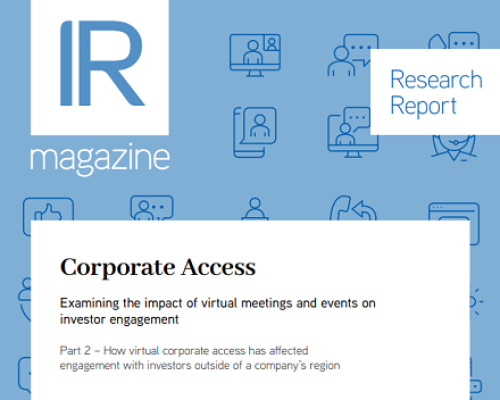There is a long-running debate about whether professional investors should get private meetings with management. If all shareholders have the right to equal information, should a select few be offered one-on-ones with the CEO or CFO?
Of course, financial regulation prohibits the release of material information in these meetings. And fund managers argue they need to conduct due diligence before investing large sums, often on behalf of the public.
But you have to assume investors get something very valuable from private meetings, otherwise they wouldn’t be so keen to schedule them.
One company trying to open up access for all shareholders is Investor Meet Company. The technology platform, launched in early 2020, helps issuers to schedule meetings with retail investors around results, capital market days and AGMs.
Founded by Marc Downes and Paul Brotherhood, who worked together at Charles Stanley Securities, the service has grown quickly amid the virtual environment of Covid-19 and now claims nearly 400 UK-listed corporate clients.
Speaking to IR Magazine, Downes says retail investors often turn to bulletin boards or chat rooms to interpret the information they receive from companies. ‘[The problem isn’t] a lack of information in the market – I think it’s the ability to understand it,’ he says. ‘That only comes through engagement and being able to ask a question.’
Institutional investors get the chance to have that engagement during non-deal roadshows, says Downes, but the retail market doesn’t. ‘We've built a digital equivalent to engage with tens, hundreds or even 1,000 people in one meeting structurally as part of the roadshow.’
On the platform, companies can schedule presentations at set times or leave calendar space open for demand-driven meetings. Some events on the platform this year have attracted 1,200 attendees, says Downes. Investors have the opportunity to ask questions before the meeting and leave feedback afterwards.
The service is free to use for online wealth management platforms and individual investors, while corporates are charged a flat fee of £3,600 ($4,950) a year, says Downes. He argues that price compares favorably with the figure a company may spend to attend an in-person retail investor conference.
Certainly, retail investors have become harder for companies to ignore. Since the start of the Covid-19 pandemic, tens of millions of individuals around the world have opened new retail brokerage accounts. Increased savings, boredom amid Covid lockdowns and a booming stock market have all played their part in attracting first-time investors.
More recently, the meme-stock mania witnessed primarily in the US has highlighted the ability of a group of retail investors to dramatically drive share prices. Only this week, cinema operator and Reddit favorite AMC jumped 25 percent in one day in the latest twist of its highly volatile year.
From a company’s perspective, retail investors can offer a number of benefits. As a group, they make up a significant pool of capital. They are often loyal customers, buying products from the companies in which they hold shares. For smaller issuers in particular, they provide vital liquidity to help draw in institutional funds.
For companies, however, it’s a challenge to engage with such a large and diverse audience. Understandably, IR teams spend most of their time focused on institutional investors, which have the power to take significant stakes in the business.
Technology is increasingly seen as part of the solution. Alongside Investor Meet Company, other services have sprung up to help connect companies with the retail market.
For example, UK-based PrimaryBid offers individual investors the chance to take part in IPOs and secondary offerings – transactions they have historically been excluded from. And the recently launched Stockperks app helps retail investors access benefits associated with their shareholdings.
Another reason companies should take retail engagement more seriously is the regulatory environment, notes Downes. He points to Section 172 of the UK’s Companies Act, which says directors must consider ‘the need to act fairly’ between shareholders.
‘If I take a presentation, sit down in a room with the biggest shareholder at BlackRock, turn through the slides and give him or her the ability to ask questions, and I don’t give everybody else that same opportunity, is it fair?’ he says.
In addition, the UK’s Corporate Governance Code calls on companies to ensure effective engagement with shareholders and other stakeholders. Downes says providing evidence of meetings and feedback with retail investors helps to satisfy this demand.










